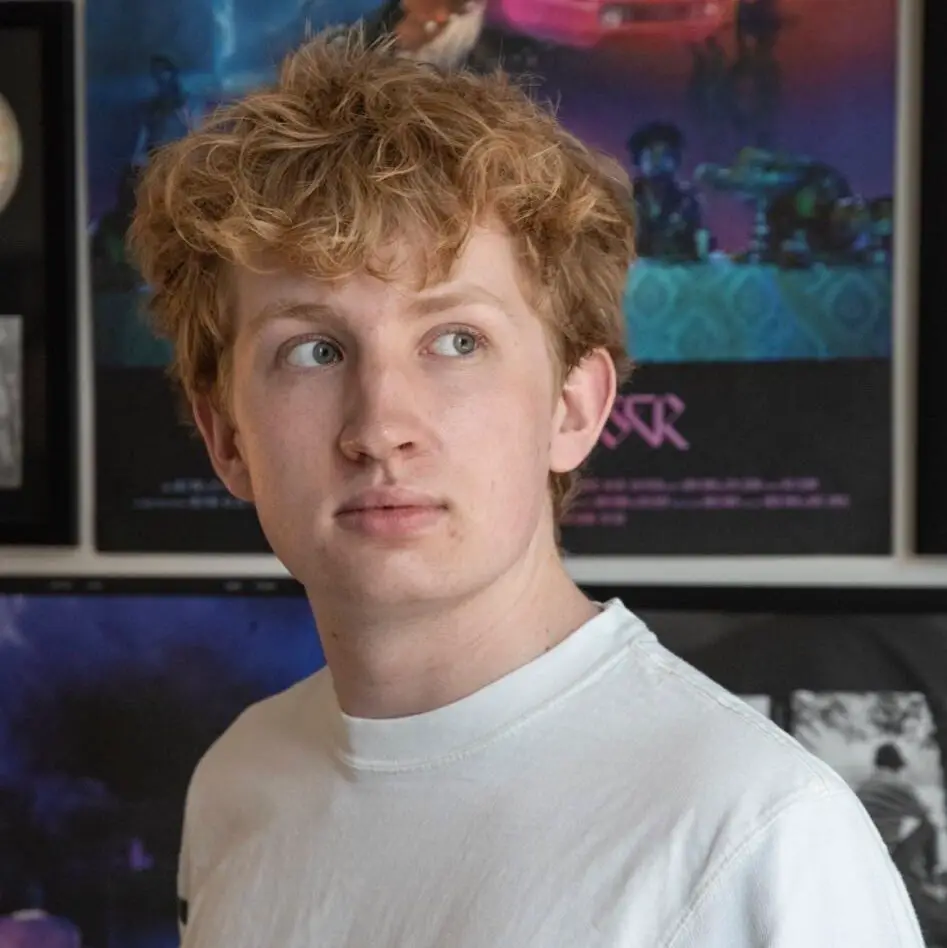Indie pop singer-songwriter Yoke Lore’s full-length debut, ‘Toward a Never Ending New Beginning,’ is a collection of nostalgic anecdotes set to the sounds of folk, indie pop, and rock.
Raised in New York by parents invested in visual arts, Yoke Lore (né Adrian Galvin) learned the ins and outs of creativity early on. By the time he attended Kenyon College in Ohio, he joined the alternative pop band Walk The Moon. Galvin departed from the band before it found its mainstream breakthrough with “Shut Up and Dance” in 2014, and instead has embraced his position as an indie rocker on the fringes of the mainstream. But that fringe status hasn’t barred him from crossover success — his 2017 song “Beige” has garnered more than 200,000,000 streams on Spotify alone.
After several years of extensive touring and releasing EPs, he’s finally delivered his full-length debut.
“Toward a Never Ending New Beginning” opens with light guitar strums on “Cruciform I.” Galvin immediately delivers vivid, poetic lyrics that quickly transport the listener into his intricate sonic world in about a minute.
“I don’t wanna set myself on fire just to keep you warm,” he sings in a high-pitched voice. He sings of “sap in our lashes, soaked from the storm,” and closes the song with a cascading instrumental that leads into the rest of the album.
The album’s third track “Shake,” is an utterly jaunty, radio-friendly snap. “Get up in your feeling and lift up your gaze/You got to find time to shake,” he sings over rolling drums. The repetition of “Sh-sh-sh-sh-sh-sh-shake,” fills the chorus and is reminiscent of something you’d hear on a nearby car stereo circa 2015.
But Galvin miraculously transposes the mid-2010’s indie sound to make it feel just as fresh and enjoyable today as it was back then. Rather than letting nostalgia work against him, he uses it to his advantage to craft favorable explorations of indie music’s past, present, and future.
“Hallucinate” situates itself “shortly after autumn,” with mid-tempo drums complimenting the laid-back guitar plucks. The song quickly ramps into easy-listening existential pondering complete with just the right amount of “la-de-da’s” in between the chorus and verses. As layers of instrumentation continue to build, electric guitar transforms the song into an uptempo cry with the recurring holler of “Why does love make me hallucinate?”
Galvin doesn’t opt for many of the stadium-shaking melodies and hooks that some of his contemporaries may, but he makes a partial exception on “Enough” which punctuates the midpoint of the record. What starts out as a simple piano number transforms into booming drums and synth snaps that carry the listener upwards while Galvin talks himself through self doubt. The song sets confessions of anxiety and doubt aflame with his elastic voice atop thick bass.
The theme is strikingly human and relatable for any listener who is occasionally crippled by worry. Using affection and infatuation as a cure for his own uneasiness, he shrugs, “I know it’s only love/But I’ll never get enough,” before quickly fretting, “And I don’t wanna fuck it up.” The song’s chorus soars high with the clamor of stacked drums and synth accompanied by Galvin’s cry out.
The album as a whole is saturated in a kind of evocative nostalgia that permeates throughout almost all of the tracks, likely thanks to Galvin’s unique vocal technique. His distinct voice can’t quite be categorized as “cursive,” which many have come to call the popular over-annunciation often found in the indie music scene. His tinny register rather stretches itself past the indie tropes to match the emotional rollercoaster that the lyrics illustrate.
His voice works alongside the at-times folksy sonics to create songs loosely reminiscent of early 2010’s indie and alternative pop that is sure to arouse hipster-fuelled nostalgia among Millenials, and anyone else who maintains memories from the time. One could make the comparison to the likes of Vance Joy, The Lumineers, and Mumford & Sons.
Another instance of Galvin releasing inhibitions to construct a scream-along arrives in the form of “Winona.” Is the song’s title a reference to the small Minnesotan collegetown of the same name? Perhaps a tribute to a Girl, Interrupted? Or maybe just a simple, non-famous love interest’s name? Whatever the origin, “Winona” delivers a triumphant flurry of thudding drums and electric guitar that ring out, prompting an uncontrollable head-bang.
The use of an unassuming and ambiguous subject and name allows for listeners to construct their own narrative out of the lyrical and sonic content. The ability to be both hyper-specific in word choice but maintain a sense of ubiquity is a revered trait among songwriters — and Galvin clearly possesses such trait.
“Winona’s” opening folksy banjo plucks are made fuller with a subtle bass backing, and are given even more body with added acoustic guitar in the pre-chorus. He declares that “All I’ve got is an unbearable song/About the memory of what was once us,” before screaming out the song’s title accompanied with some “oohs.” Background vocals assemble to make the song sound like a well-rounded radio-worthy hit. The clang of echoing drums build up into a fever-pitch as the song’s extended outro buzzes and roars in a cacophony of sound.
The album reaches its end with “Protégé,” a slinky synth number aided by the soft putter of 808 drums. “Fix my broken bones/Stay with me till I grow old/Don’t get hypnotized by the dazzling light,” he sings over the electronic instrumentation, with his voice sounding clearer than ever. The blend of styles found on the closing track spotlight a sound even more palatable and momentous than the preceding tracks.
Despite the overarching nostalgic theme and sound of the album, the reminiscent sounds don’t undermine Galvin’s efforts to forge a lane of his own. Sure, the music makes the inevitable nods to the kind of indie pop popularized throughout the previous decade, but his distinct vocal stylings and sonic melding ensure that any new listener will remember the name Yoke Lore.

















